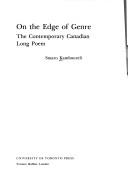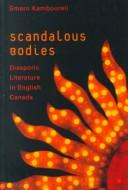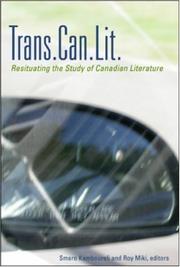| Listing 1 - 10 of 14 | << page >> |
Sort by
|

ISBN: 0802068480 0802059082 Year: 1991 Volume: 5 Publisher: Toronto, Ont. University of Toronto Press
Abstract | Keywords | Export | Availability | Bookmark
 Loading...
Loading...Choose an application
- Reference Manager
- EndNote
- RefWorks (Direct export to RefWorks)
Poetry --- American literature --- Canada --- Canadian poetry --- Epic poetry --- Literary form --- Canadian poetry (English) --- Poésie canadienne --- Poésie épique --- Genres littéraires --- History and criticism --- Theory, etc --- Histoire et critique --- Théorie, etc --- Poésie canadienne --- Poésie épique --- Genres littéraires --- History and criticism. --- Théorie, etc --- Theory, etc.

ISBN: 0195414500 Year: 2000 Publisher: Don Mills Oxford university press
Abstract | Keywords | Export | Availability | Bookmark
 Loading...
Loading...Choose an application
- Reference Manager
- EndNote
- RefWorks (Direct export to RefWorks)
Canadian literature --- Littérature canadienne --- Minority authors --- History and criticism --- Auteurs issus des minorités --- Histoire et critique --- Emigration and immigration in literature --- Ethnic groups in literature --- Immigrants in literature --- Minorities in literature --- #KOHU:CANADIANA 2000 --- 820 <71> --- Minorities as a theme in literature --- Canadian literature (English) --- English literature --- 820 <71> Engelse literatuur--Canada --- Engelse literatuur--Canada --- Minority authors&delete& --- Canada --- Emigration and immigration.
Book
ISBN: 0195410785 Year: 1996 Publisher: Toronto : Oxford University Press,
Abstract | Keywords | Export | Availability | Bookmark
 Loading...
Loading...Choose an application
- Reference Manager
- EndNote
- RefWorks (Direct export to RefWorks)
Canadian literature --- Ethnic groups --- Minorities --- Canadian fiction --- Canadian poetry --- Canadian poetry --- Littérature canadienne --- Groupes ethniques --- Minorités --- Roman canadien --- Poésie canadienne --- Poésie canadienne --- Minority authors --- Literary collections --- Literary collections --- Minority authors. --- Minority authors --- Auteurs issus des minorités --- Anthologies --- Anthologies --- Auteurs issus des minorités --- Auteurs issus des minorités
Book
ISBN: 1897126360 9781897126363 Year: 2008 Publisher: Edmonton : NeWest Press,
Abstract | Keywords | Export | Availability | Bookmark
 Loading...
Loading...Choose an application
- Reference Manager
- EndNote
- RefWorks (Direct export to RefWorks)
Barbara Godard has long been one of the most influential readers of Canadian literature. Much of the force of her work comes from her meticulous and relentless attention to the networks that produce both the texts and events we study and the methods through which we read them. Whether writing about feminist theory, orality and Native women writers, or the exigencies of the cultural field, she has been instrumental in interrogating, time and time again, the normative ways in which we think about Canadian culture. From the function of literature to the materiality of institutions and periodicals, from the theory and practice of translation to the interrelations between English- and French-Canadian literatures, her critical interventions have drastically reconceptualized our inherited understandings of Canadian culture as it relates to the world at large.
Canadian literature --- French-Canadian literature --- Literature and society --- Culture in literature. --- History and criticism. --- Culture in literature --- #KOHU:CANADIANA --- 820 <71> --- Literature --- Literature and sociology --- Society and literature --- Sociology and literature --- Sociolinguistics --- 820 <71> Engelse literatuur--Canada --- Engelse literatuur--Canada --- History and criticism --- Social aspects --- Littérature canadienne --- Littérature et société --- Histoire et critique --- Canada --- Littérature canadienne --- Littérature et société
Book
ISBN: 088864678X 9780888646781 9780888645418 0888645414 Year: 2012 Publisher: Edmonton, Canada : The University of Alberta Press,
Abstract | Keywords | Export | Availability | Bookmark
 Loading...
Loading...Choose an application
- Reference Manager
- EndNote
- RefWorks (Direct export to RefWorks)
Is market-driven research healthy? Responding to the language of "knowledge mobilization" that percolates through Canadian postsecondary education, the literary scholars who contributed these essays address the challenges that an intensified culture of research capitalism brings to the humanities in particular. Stakeholders in Canada's research infrastructure-university students, professors, and administrators; grant policy makers and bureaucrats; and the public who are the ultimate inheritors of such knowledge-are urged to examine a range of perspectives on the increasingly entrepreneurial university environment and its growing corporate culture.
Universities and colleges --- Humanities --- Learning and scholarship --- Classical education --- Colleges --- Degree-granting institutions --- Higher education institutions --- Higher education providers --- Institutions of higher education --- Postsecondary institutions --- Public institutions --- Schools --- Education, Higher --- Research --- Study and teaching (Graduate) --- Economics. --- Humanities. --- University Administration.
Book
ISBN: 1554589134 1554589126 9781554589128 9781554589135 9781554589111 1554589118 Year: 2014 Publisher: Waterloo, Ontario Ottawa, Ontario
Abstract | Keywords | Export | Availability | Bookmark
 Loading...
Loading...Choose an application
- Reference Manager
- EndNote
- RefWorks (Direct export to RefWorks)
Critical Collaborations: Indigeneity, Diaspora, and Ecology in Canadian Literary Studies is the third volume of essays produced as part of the TransCanada conferences project. The essays gathered in Critical Collaborations constitute a call for collaboration and kinship across disciplinary, political, institutional, and community borders. They are tied together through a simultaneous call for resistance--to Eurocentrism, corporatization, rationalism, and the fantasy of total systems of knowledge--and a call for critical collaborations. These collaborations seek to forge connections without perceived identity--linking concepts and communities without violating the differences that constitute them, seeking epistemic kinships while maintaining a willingness to not-know. In this way, they form a critical conversation between seemingly distinct areas and demonstrate fundamental allegiances between diasporic and indigenous scholarship, transnational and local knowledges, legal and eco-critical methodologies. Links are forged between Indigenous knowledge and ecological and social justice, creative critical reading, and ambidextrous epistemologies, unmaking the nation through translocalism and unsettling histories of colonial complicity through a poetics of relation. Together, these essays reveal how the critical methodologies brought to bear on literary studies can both challenge and exceed disciplinary structures, presenting new forms of strategic transdisciplinarity that expand the possibilities of Canadian literary studies while also emphasizing humility, complicity, and the limits of knowledge.
Canadian literature --- Criticism --- Literature and society --- Literature --- Literature and sociology --- Society and literature --- Sociology and literature --- Sociolinguistics --- Evaluation of literature --- Literary criticism --- Rhetoric --- Aesthetics --- Canadian literature (English) --- English literature --- History and criticism --- Theory, etc. --- Social aspects --- Technique --- Evaluation --- Canadian literature. --- Diaspora. --- Eco-criticism. --- Indigeneity. --- Interdisciplinarity.
Book
ISBN: 1554583969 1299313248 9781554583966 9781554588619 1554588618 1554583659 9781554583652 9781299313248 155458860X 9781554588602 9781554588336 1554588332 Year: 2012 Publisher: Waterloo, Ont. Wilfrid Laurier University Press
Abstract | Keywords | Export | Availability | Bookmark
 Loading...
Loading...Choose an application
- Reference Manager
- EndNote
- RefWorks (Direct export to RefWorks)
Tens of thousands of people around the world die each day from causes that could have been prevented with access to affordable health care resources. In an era of unprecedented global inequity, Cuba, a small, low-income country, is making a difference by providing affordable health care to millions of marginalized people. Cuba has developed a world-class health care system that provides universal access to its own citizens while committing to one of the most extensive international health outreach campaigns in the world. The country has trained thousands of foreign medical students for free under a moral agreement that they serve desperate communities. To date, over 110,000 Cuban health care workers have served overseas. Where No Doctor Has Gone Before looks at the dynamics of Cuban medical internationalism to understand the impact of Cuba’s programs within the global health landscape. Topics addressed include the growing moral divide in equitable access to health care services, with a focus on medical tourism and Cuba’s alternative approach to this growing trend. Also discussed is the hidden curriculum in mainstream medical education that encourages graduates to seek lucrative positions rather than commit to service for the marginalized. The author shows how Cuba’s Escuela Latinoamericana de Medicina (ELAM) serves as a counter to this trend. An acknowledgement of Cuba’s tremendous commitment, the book reveals a compelling model of global health practice that not only meets the needs of the marginalized but facilitates an international culture of cooperation and solidarity.
Literature and state --- Criticism --- Canadian literature --- Canadian literature (English) --- English literature --- Evaluation of literature --- Literary criticism --- Literature --- Rhetoric --- Aesthetics --- State and literature --- Authors and patrons --- Cultural policy --- History and criticism --- Theory, etc. --- Technique --- Evaluation --- Medical care --- Medical education --- Delivery of health care --- Delivery of medical care --- Health care --- Health care delivery --- Health services --- Healthcare --- Medical and health care industry --- Medical services --- Personal health services --- Public health --- Medical personnel --- Professional education --- International cooperation. --- Education --- Littérature canadienne --- Critique --- Littérature --- Histoire et critique --- Politique gouvernementale

ISBN: 0889205132 9780889205130 Year: 2007 Publisher: Waterloo Wilfrid Laurier university press
Abstract | Keywords | Export | Availability | Bookmark
 Loading...
Loading...Choose an application
- Reference Manager
- EndNote
- RefWorks (Direct export to RefWorks)
Canadian literature --- Literature and globalization --- Literature and state --- Minority authors --- History and criticism
Book
ISBN: 091928535X Year: 1986 Publisher: Edmonton : Longspoon,
Abstract | Keywords | Export | Availability | Bookmark
 Loading...
Loading...Choose an application
- Reference Manager
- EndNote
- RefWorks (Direct export to RefWorks)
Canadian literature --- French-Canadian literature --- Women and literature --- Littérature canadienne --- Littérature canadienne-française --- Femmes et littérature --- Women authors --- History and criticism --- Women authors --- History and criticism --- Femmes écrivains --- Histoire et critique --- Femmes écrivains --- Histoire et critique
Book
ISBN: 1771120940 1771120932 9781771120937 9781771120944 1771121114 Year: 2016 Publisher: Waterloo, Ontario
Abstract | Keywords | Export | Availability | Bookmark
 Loading...
Loading...Choose an application
- Reference Manager
- EndNote
- RefWorks (Direct export to RefWorks)
This collection of essays focuses on the varied and complex roles that editors have played in the production of literary and scholarly texts in Canada. With contributions from a wide range of participants who have played seminal roles as editors of Canadian literatures-from nineteenth-century works to the contemporary avant-garde, from canonized texts to anthologies of so-called minority writers and the oral literatures of the First Nations-this collection is the first of its kind. Contributors offer incisive analyses of the cultural and publishing politics of editorial practices that question inherited paradigms of literary and scholarly values. They examine specific cases of editorial production as well as theoretical considerations of editing that interrogate such key issues as authorial intentionality, textual authority, historical contingencies of textual production, circumstances of publication and reception, the pedagogical uses of edited anthologies, the instrumentality of editorial projects in relation to canon formation and minoritized literatures, and the role of editors as interpreters, enablers, facilitators, and creators. Editing as Cultural Practice in Canada situates editing in the context of the growing number of collaborative projects in which Canadian scholars are engaged, which brings into relief not only those aspects of editorial work that entail collaborating, as it were, with existing texts and documents but also collaboration as a scholarly practice that perforce involves co-editing.
Editors --- Editing --- Persons --- Authorship --- Political aspects --- Social aspects
| Listing 1 - 10 of 14 | << page >> |
Sort by
|

 Search
Search Feedback
Feedback About UniCat
About UniCat  Help
Help News
News